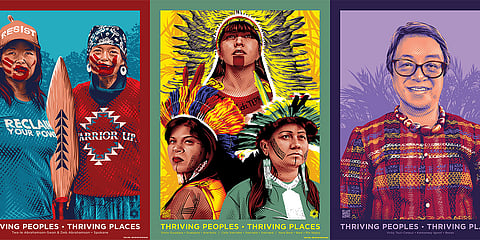'Thriving Peoples, Thriving Places': Pop Art Campaign Honors the Contributions of Indigenous Women to Global Biodiversity
by Nia Tero
(This article originally appeared on Real Change and has been reprinted under an agreement.)
We are in a critical moment. In the midst of an ongoing global pandemic that is leaving no family untouched, compounded by increasingly extreme weather events linked to climate change, a unique global art project is shining a light on voices essential to the ecological solutions and collective healing we seek: Indigenous women.
"Thriving Peoples, Thriving Places" is a collaboration between two Seattle-based not-for-profit organizations — Indigenous-focused Nia Tero and design lab Amplifier — launching on International Day of the World's Indigenous Peoples, which is Aug. 9. The global exhibit includes six original portraits commissioned from Washington, D.C.-based artist and illustrator Tracie Ching. The art will be available digitally as well as at public art events in cities, including Seattle, Washington, D.C., New York City, So Paulo, and London. The project celebrates Indigenous women who have acted as stewards of biodiversity across Earth and prompts action amongst an engaged global audience.
The nine Indigenous women at the center of this project are robust examples of real action we can take to strive for the health and future of the planet. They are from communities spanning the globe, from the Philippines and New Zealand, to the Brazilian Amazon to Scandinavia, to the global north, embodying Indigenous experience while carrying generational knowledge and inherited dedication:
This campaign precedes several critical global convenings, including the International Union for Conservation of Nature in Marseille, France, in September, the U.N. Climate Change Conference in Glasgow, Scotland, in November, and additional critical climate and biodiversity conversations in 2022 and beyond.
At global policy events such as these, from which decisions evolve affecting how governments around the world respond to global issues and emergencies, the presence and participation of Indigenous women is vital. As acknowledged by the U.N. Department of Economic and Social Affairs, "Despite their enormous assets and contribution to society, Indigenous women still suffer from multiple discrimination, both as women and as Indigenous individuals. They are subjected to extreme poverty, trafficking, illiteracy, lack of access to ancestral lands, non-existent or poor health care, and to violence in the private and the public sphere." As such, Indigenous women are at the intersections of the world's most pressing issues — and the urgency and solutions needed to address them — meaning their presence and leadership in global policy discussions is essential.
The activists, artists, and scholars at the heart of "Thriving Peoples, Thriving Places" exemplify the ideals of guardianship, kinship, reciprocity, and wisdom. Their voices, work, and leadership benefit not only their own people and communities, but all of us who share this planet, which is why now, more than ever, we must celebrate them, listen to them, and, most importantly, follow their lead.
Learn more about "Thriving Peoples, Thriving Places" at https://niatero.org/overview.
📸 Featured Image: Three of the images from "Thriving Peoples, Thriving Places." Artwork by Tracie Ching. Images courtesy of Real Change.
Before you move on to the next story …
The South Seattle Emerald™ is brought to you by Rainmakers. Rainmakers give recurring gifts at any amount. With around 1,000 Rainmakers, the Emerald™ is truly community-driven local media. Help us keep BIPOC-led media free and accessible.
If just half of our readers signed up to give $6 a month, we wouldn't have to fundraise for the rest of the year. Small amounts make a difference.
We cannot do this work without you. Become a Rainmaker today!
Help keep BIPOC-led, community-powered journalism free — become a Rainmaker today.


